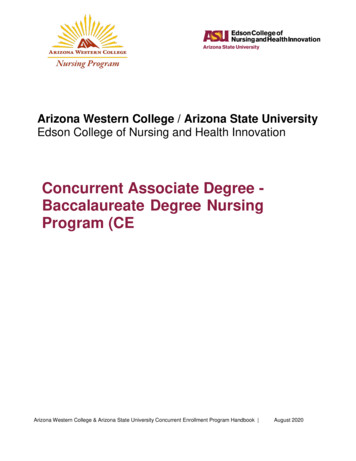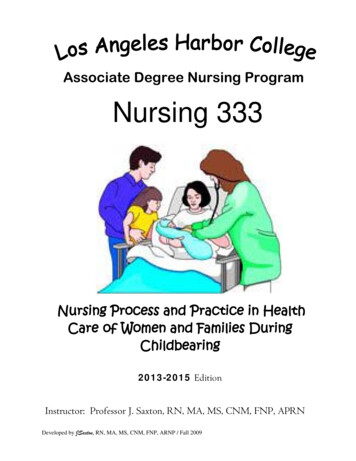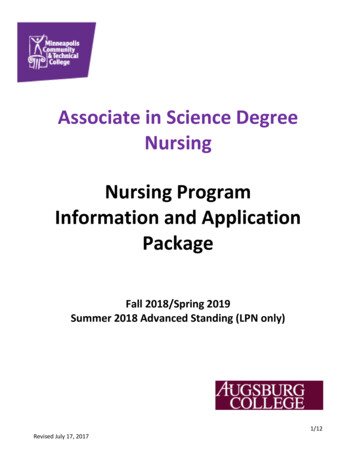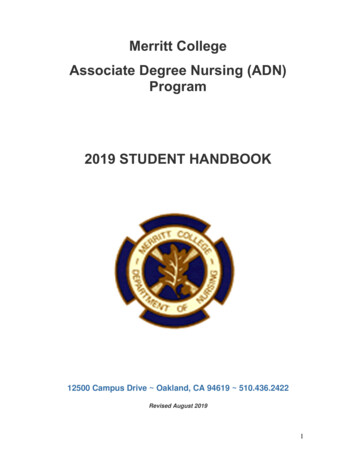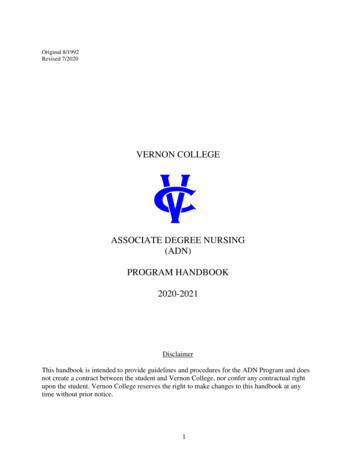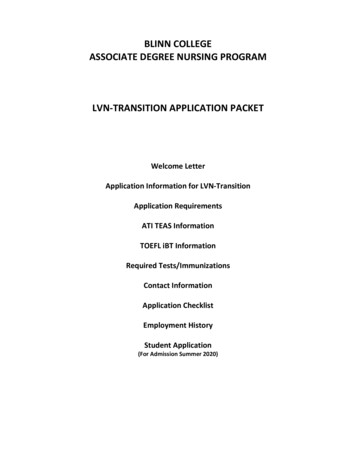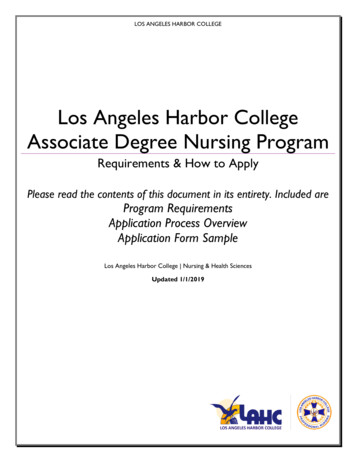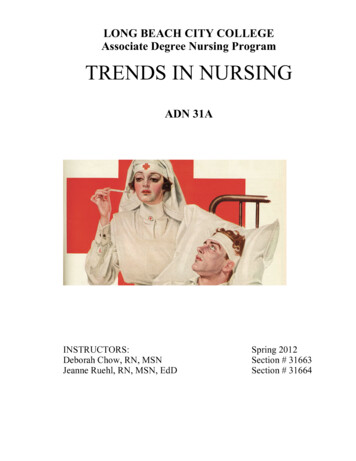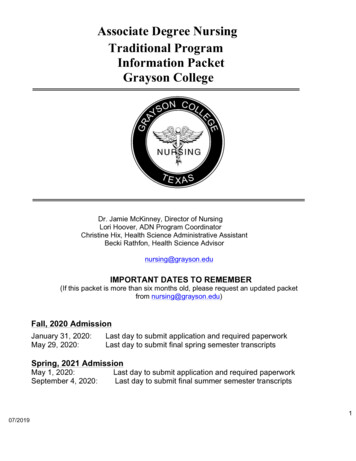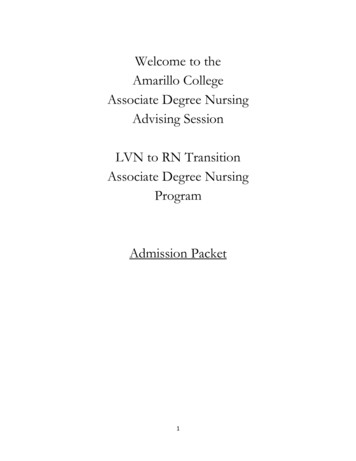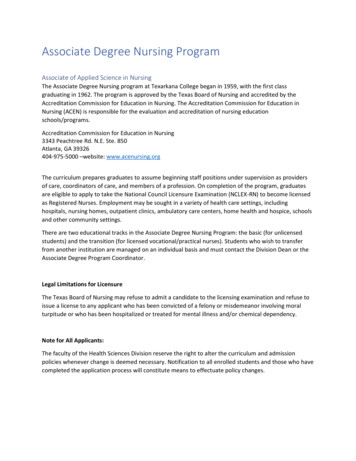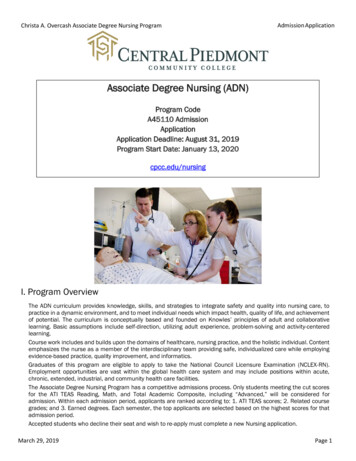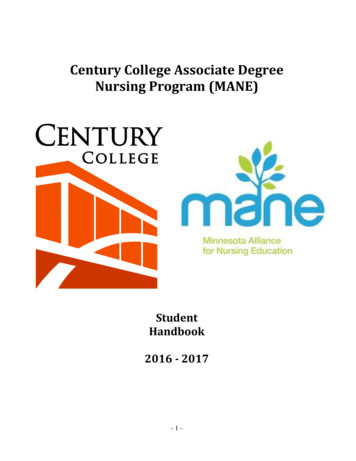
Transcription
Century College Associate DegreeNursing Program (MANE)StudentHandbook2016 - 2017-1-
-2-
ContentsFORWARD-6-WELCOME/INTRODUCTION-7-MINNESOTA STATE COLLEGES AND UNIVERSITIES MISSIONMINNESOTA STATE COLLEGES AND UNIVERSITIES VISION-7-7-CENTURY COLLEGE AND THE ASSOCIATE OF SCIENCE IN NURSING PROGRAM-8-CENTURY NURSING PROGRAM MISSION:CENTURY NURSING PROGRAM VISION:CENTURY NURSING PROGRAM GOALS:PROGRAM OUTCOMES (POS):-8-8-8-9-MINNESOTA ALLIANCE FOR NURSING EDUCATION (MANE)-9-MANE CURRICULUM PLANMANE MISSIONMANE VISIONMINNESOTA ALLIANCE FOR NURSING EDUCATION (MANE) PHILOSOPHY STATEMENTMANE CORE VALUES STATEMENTMANE CONCEPTSMACRO-CONCEPTSCURRICULAR CONCEPTSMANE COMPETENCE STATEMENTS-9- 10 - 10 - 10 - 10 - 11 - 11 - 11 - 11 -CENTURY COLLEGE MANE CURRICULUM PLAN- 13 -MANE PROGRAM STUDENT LEARNING OUTCOMES- 14 -5TH SEMESTER BENCHMARK8TH SEMESTER BENCHMARK- 14 - 14 -MANE GUIDING STANDARDS- 15 -PROGRAM STUDENT LEARNING OUTCOMES ARE FRAMED AROUND THE AACN BACCALAUREATE ESSENTIALS (AACN, 2008)QUALITY AND SAFETY EDUCATION FOR NURSES (QSEN, 2010)DUAL ADMISSIONEQUAL OPPORTUNITY PROGRAM:APPROVAL/ACCREDITATION STATUSCLINICAL FACILITIES- 15 - 15 - 15 - 16 - 16 - 16 --3-
NURSING PROGRAM RESOURCES- 17 -NURSING PROGRAM ADMINISTRATIONNURSING FACULTY AND DATA COORDINATORNURSING RESOURCE CENTER (NURSING LAB & CLASSROOM)ANNUAL BACKGROUND STUDY CLEARANCEUPDATED CPR COURSE AND IMMUNIZATIONSUPDATED NAME, ADDRESS AND CONTACT INFO- 17 - 17 - 17 - 18 - 18 - 18 -NURSING COURSES: THEORY, LAB & CLINICAL- 18 -COURSE CALENDARSTHEORY DISCUSSIONSCLASSROOM POLICIESDESIRE 2 LEARN (D2L)STUDYINGNURSING THEORY EXAMSEXAM/TEST REVIEW POLICYTHE ACCESS CENTER/DISABILITY SERVICESNURSING RESOURCE CENTER - LAB/CLINICALNURSING RESOURCE CENTER ACTIVITIESNURSING RESOURCE CENTER SAFETY POLICY:NURSING LABORATORY PROTOCOL FOR BLOOD OR BODY FLUID EXPOSURE (ON CAMPUS)CLINICAL FACILITY PROTOCOL IF BLOOD OR BODY FLUIDS EXPOSURE (OFF CAMPUS)NURSING MEDICATION DOSAGES TESTSWRITTEN ASSIGNMENTSCLINICAL FACILITIESCLINICAL PERFORMANCESTUDENT RESPONSIBILITIES IN THE CLINICAL SETTINGPROFESSIONAL DRESSCLINICAL DRESS CODECLINICAL EVALUATIONLAB PRESCRIPTIONSSERVICE LEARNING- 18 - 18 - 19 - 19 - 20 - 20 - 21 - 21 - 22 - 22 - 23 - 23 - 24 - 24 - 25 - 25 - 25 - 25 - 26 - 26 - 27 - 27 - 27 -PROGRAM POLICIES- 28 -ACADEMIC AND CONDUCT EXPECTATIONS- 28 -ACADEMIC EXPECTATIONSSTUDENT CONDUCTEXPECTATIONS THAT MAY HAVE BOTH ACADEMIC AND CONDUCT CONSEQUENCESCLINICAL PLACEMENT CONCERNSATTENDANCE POLICYTHEORY/CLASS ATTENDANCENURSING LAB ATTENDANCECLINICAL ATTENDANCECONFIDENTIALITY POLICYSOCIAL MEDIA POLICY- 28 - 28 - 29 - 29 - 29 - 29 - 29 - 30 - 30 - 30 --4-
FURTHER INFORMATION:CONSEQUENCES:COURSE PROGRESSION AND GRADING POLICIESCOURSE PROGRESSION AND PROGRAM COMPLETIONGRADING POLICYWITHDRAWALSINCOMPLETE GRADESFAILED COURSERE-ENTRY/RE-ADMISSION POLICYRE-ENTRY PROCESSRE-ENTRY PROCESS FOR STUDENTS WHO SELECT TO EXIT AFTER SUCCESSFUL COMPLETION OF SEMESTER 5DISCIPLINARY POLICIESLEARNING CONTRACTSACADEMIC AND PROFESSIONAL INTEGRITYAcademic IntegrityProfessional IntegrityDUE PROCESS FOR PROGRAM PERFORMANCE CONCERNSNURSING STUDENT CONCERN PROCESSGRADUATION REQUIREMENTS- 32 - 32 - 33 - 33 - 33 - 34 - 34 - 34 - 34 - 35 - 35 - 36 - 36 - 36 - 36 - 37 - 38 - 39 - 39 -APPENDICES- 40 -MINNESOTA ALLIANCE FOR NURSING EDUCATION (MANE) GLOSSARY OF TERMSMNSCU TECHNICAL STANDARDS FOR ENTRY LEVEL NURSING PROGRAMSBLOOD AND BODY FLUID EXPOSURE PROTOCOL CHECKLISTSTUDENT CONTACT INFORMATION CHANGE FORMSTUDENT AGREEMENT VERIFICATION FORMCONCERN FORMLAB PRESCRIPTION FOR CLINICAL REMEDIATIONLAB PRESCRIPTION FOR UNSUCCESSFUL PERFORMANCE ON SKILLS VALIDATIONSCONSENT TO RELEASE INFORMATIONNURSING STUDENT LEARNING CONTRACTNURSING STUDENT RE-ENTRY APPLICATION FORM- 41 - 47 - 52 - 54 - 56 - 58 - 60 - 62 - 66 - 68 - 70 -This handbook is intended to introduce the student to the Century College Associate Degree MANE NursingProgram. If students can develop a broad perspective of program requirements and long-range goals, they aremore likely to establish realistic expectations of their own performance. This handbook is subject to change at anytime. Students will be notified of changes to this handbook. Century College, 2016 - All Rights ReservedThe material in this handbook may not be copied in whole or in part without the written consent of CenturyCollege.-5-
FORWARDThis handbook has been prepared for use by the students enrolled in the Nursing Program at Century College. Itaddresses the general information, policies and standards necessary to maintain an effective and efficient nursingeducation program.The Century College Course Catalog addresses the policies for all students at the College, including nursingstudents. Nursing students must refer to the Century College Course Catalog for all information that is not specificto the nursing program. This handbook can be found at: he policies within this Nursing Student Handbook are in effect for all students enrolled in the nursingprogram. Students are held responsible for being informed on all nursing policies, procedures and regulations aspublished in this handbook, and the college catalog. Students are also held responsible for any new nursingrelated policies or changes in existing policies announced via e-mail, course web sites (D2L) or announcements inclass.-6-
Welcome/IntroductionMinnesota State Colleges and Universities MissionThe Minnesota State Colleges and Universities (MnSCU) system of distinct and collaborative institutions offershigher education that meets the personal and career goals of a wide range of individual learners, enhances thequality of life for all Minnesotans and sustains vibrant economies throughout the state.Minnesota State Colleges and Universities provides high quality programs comprising:1.Technical education programs delivered principally by technical colleges, which prepare studentsfor skilled occupations that do not require a baccalaureate degree.2.Pre-baccalaureate programs, delivered principally by community colleges, which offer lowerdivision instruction in academic programs, occupational programs in which all credits earned will beaccepted for transfer to a baccalaureate degree in the same field of study, and remedial studies.3.Baccalaureate programs delivered by state universities, which offer undergraduate instruction anddegrees; and4.Graduate programs, delivered by state universities, including instruction through the master'sdegree, specialist certificates and degrees, and applied doctoral degrees.Minnesota State Colleges and Universities VisionThe Minnesota State Colleges and Universities will enable the people of Minnesota to succeed by providing themost accessible, highest value education in the nation.-7-
Century College and the Associate of Science in Nursing ProgramCentury College is accredited by the Higher Learning Commission and is a member of the North Central Associationof Colleges and Schools. Century College Associate Degree Nursing Program (ADN) maintains current programaccreditation through the Accreditation Commission for Education in Nursing, Inc., or ACEN.The Century College Associate Degree Nursing Program is designed to educate students who are pursuingprofessional nursing careers. The program will provide opportunities to administer safe, quality, holistic, patientcentered nursing care in a variety of healthcare settings in our increasingly diverse communities. Courseworkincludes nursing theory focusing on holistic assessment and therapeutic nursing interventions. Concepts ofcommunication, clinical judgment and reasoning, inter-professional collaboration, informatics, qualityimprovement, and leadership/management are emphasized. Clinical application occurs in acute, sub-acute andlong-term care facilities, community clinics, schools and home health settings. Safe, caring, competent nursing careacross the lifespan is fostered. Graduates are awarded an associate in science degree in nursing, meet the MinnesotaState Board of Nursing requirements for licensure, and are eligible to apply to take the National Council LicensureExam for Registered Nurses (NCLEX-RN ). Both Traditional Track and Mobility Tracks for qualified licensedpractical nurses (LPN) are offered through a partnership with the Minnesota Alliance for Nursing Education(MANE).Century Nursing Program Mission:The Century College Associate Degree Nursing Program is committed to inspiring life-long learning andempowering students to positively impact the evolving health care needs of the community through safe,purposeful, and evidence-based professional nursing practice.Century Nursing Program Vision:To be a leader in associate-degree nursing by preparing quality and compassionate nurses through an innovativecurriculum.Century Nursing Program Goals:Based on our philosophy and beliefs about Associate Degree Nursing, the faculty has identified the following goals: Prepare associate degree nurses to provide safe, patient-centered, and holistic care in entry level positionsin nursing practice. Prepare graduates who are qualified to take the National Council Licensure Examination for RegisteredNurses (NCLEX-RN). Provide an opportunity for nursing students to develop their commitment to personal and professionalgrowth. Prepare students for and promote continued formal professional nursing education. Prepare culturally-aware graduates to work within a diverse and ever-changing world.-8-
Program Outcomes (POs):Program outcomes are performance indicators that reflect the extent to which the purposes of the nursingeducation unit are achieved and by which program effectiveness is documented. Program outcomes aremeasurable consumer-oriented indexes designed to evaluate the degree to which the program is achieving itsmission and goals. The Century College nursing faculty have determined the following POs for the curriculum: Pass rate for first time NCLEX-RN test takers will be at or above the national mean for associate degreeprograms. Graduates will successfully complete all program student learning outcomes and course outcomes. Completion rate of the nursing program will be at or above 80%. At least 80% of employers will report satisfaction with graduate readiness for practice. At least 80% of graduates will report satisfaction of the Century College Nursing Program. Ninety percent of graduates will find employment as a registered nurse within one year of graduation. Seventy five percent of graduates will have a plan to continue formal professional nursing education.Minnesota Alliance for Nursing Education (MANE)The MANE curriculum is transformative, moving away from independent silos of education to collaborationbetween universities, community colleges and practice. MANE is a collaboration between community college anduniversity nursing programs to provide increased student access to a baccalaureate program and attainment of aBachelor of Science in Nursing (BSN) degree. Students admitted to a community college MANE program will bedually admitted to Metropolitan State University.The program was built following a thorough analysis of national standards including AACN, CCNE, NLN, ACEN(NLNAC), PEW, OCNE, and QSEN from which ten program competencies have been developed. This 120 credit,eight semester program has collaboratively developed prerequisites, admission processes, grading scales, and aProgram Plan across all collaborating colleges and universities.MANE Curriculum PlanThe MANE Program Plan content is taught within a concept-based curriculum which spirals concepts throughoutthe program. Nursing courses are sequential in nature due to the spiraled teaching/learning methodology.The MANE Program Plan is a baccalaureate curriculum based on The Essentials of Baccalaureate Education(American Association of Colleges of Nursing [AACN], 2008) with Program Student Learning Outcomes (PSLO’s)benchmarked at the fifth and eight semesters of the program. A student enrolled at a MANE community collegemay elect to receive an Associate of Science Degree in Nursing at the successful completion of the fifth semester.The student is expected to continue to the completion of the Bachelor of Science in nursing degree.An applicant admitted to the MANE collaborating college will be considered dually admitted to a collaboratinguniversity.-9-
MANE MissionThe mission of the Minnesota Alliance for Nursing Education (MANE) is to increase baccalaureate preparednurses through collaborative, transformative educational strategies.MANE VisionThrough increased access to baccalaureate nursing education MANE will prepare professional nurses to promotehealth and meet the evolving and complex healthcare needs of an increasingly diverse population in Minnesota.Minnesota Alliance for Nursing Education (MANE) Philosophy StatementWe believe the purpose of nursing education is to prepare professional nurses in a partnered curriculum topractice successfully in today’s complex health care environment, respond to future health care needs, and lead inthe broader health care system. A commitment to excellence in professional nursing practice, based on a set ofshared core nursing values and innovation, is reflected in the use of integrative review in a spiraled, competencybased curriculum. We believe in a transformative curriculum that moves away from independent silos ofeducation to a combined effort between universities, community colleges, and practice with the goal of increasingnumbers of baccalaureate prepared nurses in Minnesota. This shared curriculum fosters a seamless transitionfrom associate to baccalaureate nursing education. We believe baccalaureate nursing education enhances acomprehensive understanding of healthcare policy, research, systems leadership, and community health nursing.MANE nursing graduates are educated to use the best available evidence in making sound clinical judgmentsduring provision of safe, high quality, holistic nursing care across the lifespan and the health continuum. Webelieve with the use of informational technology, a nurse is prepared to provide health care in a variety ofenvironments. We believe nurses act as transformational leaders as vital members of a health care team. Astrong focus on health promotion supports nursing graduates to best serve diverse individuals, families, andcommunities locally, nationally, and globally.We believe adult learners must be actively engaged in the learning process. We value lifelong learning, reflectivenursing practice, and insights gained through self-analysis and self-care. Faculty members teaching in the MANEcurriculum model professionalism, scholarship, inclusiveness, beneficence, and collegiality. This transformativeapproach to nursing education encourages deep understanding of key nursing concepts while addressing thechanging healthcare environment.MANE Core Values StatementMANE is dedicated to achieving our mission and vision in a manner consistent with our values of: Innovation and the Pursuit of Excellence Collaboration and Partnership Integrity and Accountability Mutual Respect and Collegiality Diversity and Inclusiveness Responsiveness to local and global healthcare needs- 10 -
MANE ConceptsThe curriculum includes concepts that are spiraled throughout the curriculum.Macro-Concepts Foci of CareProfessional IntegrityPsychological IntegrityPhysiological integrityLifespan/Growth and DevelopmentCurricular Concepts Professional development and identityCollaborative nced-Based Practice & Quality ImprovementDiversity and CultureSee MANE Glossary of Terms in appendices.MANE Competence StatementsCompetencies describe the knowledge; skills and attitudes expected upon graduation and are categorizedaccording to the nine baccalaureate essentials (AACN, 2008). The competencies are leveled for the baccalaureateand associate degree completion points. A hallmark of the competency model is a spiral approach to teaching andlearning. Competencies are revisited throughout the curriculum with increasing levels of difficulty and with newlearning building on previous learning. A competent nurse develops insight through reflection, self-analysis, self-care and lifelong learning.A competent nurse demonstrates leadership as part of a health care team.A competent nurse effectively uses leadership principles, strategies and tools.A competent nurse locates, evaluates, and uses the best available evidence.A competent nurse utilizes information technology systems including decision support systems to gatherevidence to guide practice.A competent nurse practices within, utilizes and contributes to the broader health care system.A competent nurse practices relationship centered care.A competent nurse communicates effectively.A competent nurse’s personal and professional actions are based on a set of shared core nursing values.A competent nurse makes sound clinical judgments.- 11 -
- 12 -
Century College MANE Curriculum PlanYear123Fall/Spring SemesterCreditsTotalSpring/Fall SemesterCreditsTotal MnTC General Education Electivesor BIOL 1020 and CHEM 1020 asrequired for BIOL 2031 PSYC 1020: General Psychology Communication elective: chooseone of COMM 1031: Interpersonal,or COMM 1041: Small Group orCOMM 1051: InterculturalCommunicationDual Admission to NursingProgram at Century and UpperDivision 4-year partner college Traditional Only: *NURS 2700:Foundations of Nursing – HealthPromotion (9 credits) OR MobilityOnly: *NURS 2720: Transition tothe Role of the Professional Nurse(4 credits plus 5 advanced standingcredits). *NURS 2750: Nutrition and theRole of the Professional Nurse BIOL 2032: Anatomy/PhysiologyII *NURS 2900: Acute & ComplexCare *NURS 2920: AppliedPathophysiology for Nursing II *NURS 2950: Nursing LeadershipI PHIL 1035: Biomedical Ethics815 BIOL 2031:Anatomy/Physiology I PSYC 1041: DevelopmentalPsychology ENGL 1021: Composition I MnTC Gen Education Goal5 in Sociology orAnthropology415 *NURS 2800: Chronic &Palliative Care NURS 2820: Pharmacologyand the Role of theProfessional Nurse *NURS 2850: AppliedPathophysiology forNursing I BIOL 2035: Microbiology743159 NURS 459: Population Based CareNURS 464: Nursing Leadership IINURS 446: Nursing InformaticsAny Upper Division course(General Education or elective,Metro or transfer credit)431532324715233Associate of Science in NursingDegreeEligible for NCLEX-RN andlicensure447423 Credits in AS Degree: 35 nursing; 40 general education 75 total Credits after licensure eligibility to BSN: 30 cr. NURS;12 cr. gen ed. (8 must be upper div. Lib. Ed.) and 3 upperdiv. electives to reach 40 cr. upper division total. Total Program Credits: 65 nursing & 55 prerequisites/gen ed 120 15Upper Division Level:Taught by 4-year partneron Century Campus fromthis point forward.4 NURS 406 Nursing Care ofthe Family3 NURS 416: Epidemiologyfor Nursing4 MATH 1025: Statistics(Century) or STAT 201(Metro State)4 WRIT 331: Writing in yourMajor (Metro, Upper Div.level required )16714 NURS 490: IntegrativeSeminar & Practicum3 NURS 485: Global HealthPerspectives for Nursing4 Upper Division LiberalStudies (Metro or transfercredit)Eligible for Bachelor ofScience in Nursing* Courses are taken concurrently within the semester.All nursing courses in each semester must be successfullycompleted to progress to the next semester.Gen ed courses may be taken earlier but not later than theidentified semester.Traditional students take NURS 2700, Mobility students takeNURS 2720.- 13 -
MANE Program Student Learning OutcomesProgram student learning outcomes are broad performance indicators of learning at the successful completion ofthe curriculum. These outcomes relate to the knowledge, skills and attitudes needed of the baccalaureate andassociate degree graduate. These are measured after semesters five and eight of the curriculum.5th Semester Benchmark
The Century College Associate Degree Nursing Program is designed to educate students who are pursuing professional nursing careers. The program will provide opportunities to administer safe, quality, holistic, patient- centered nursing care in a variety of healthcare
